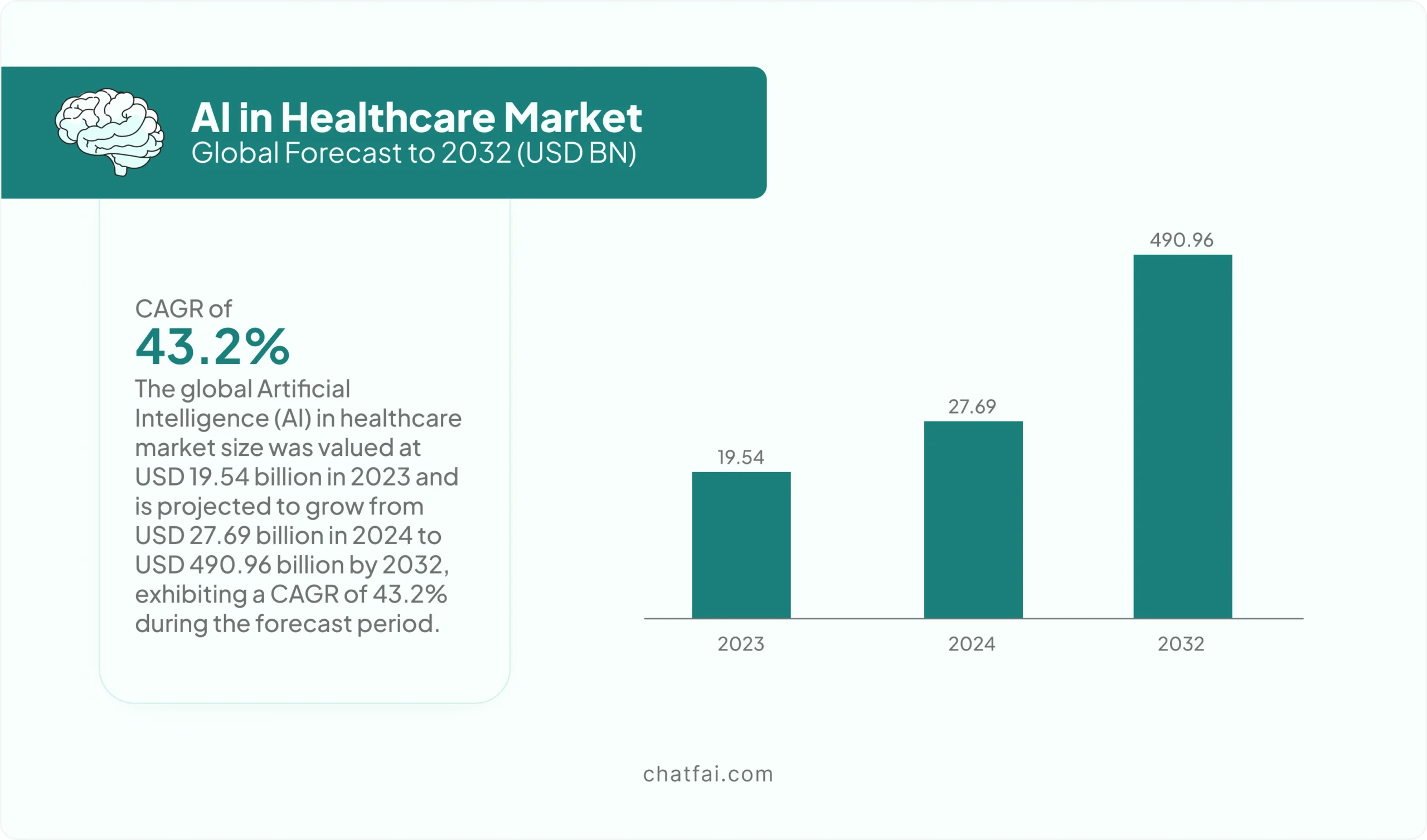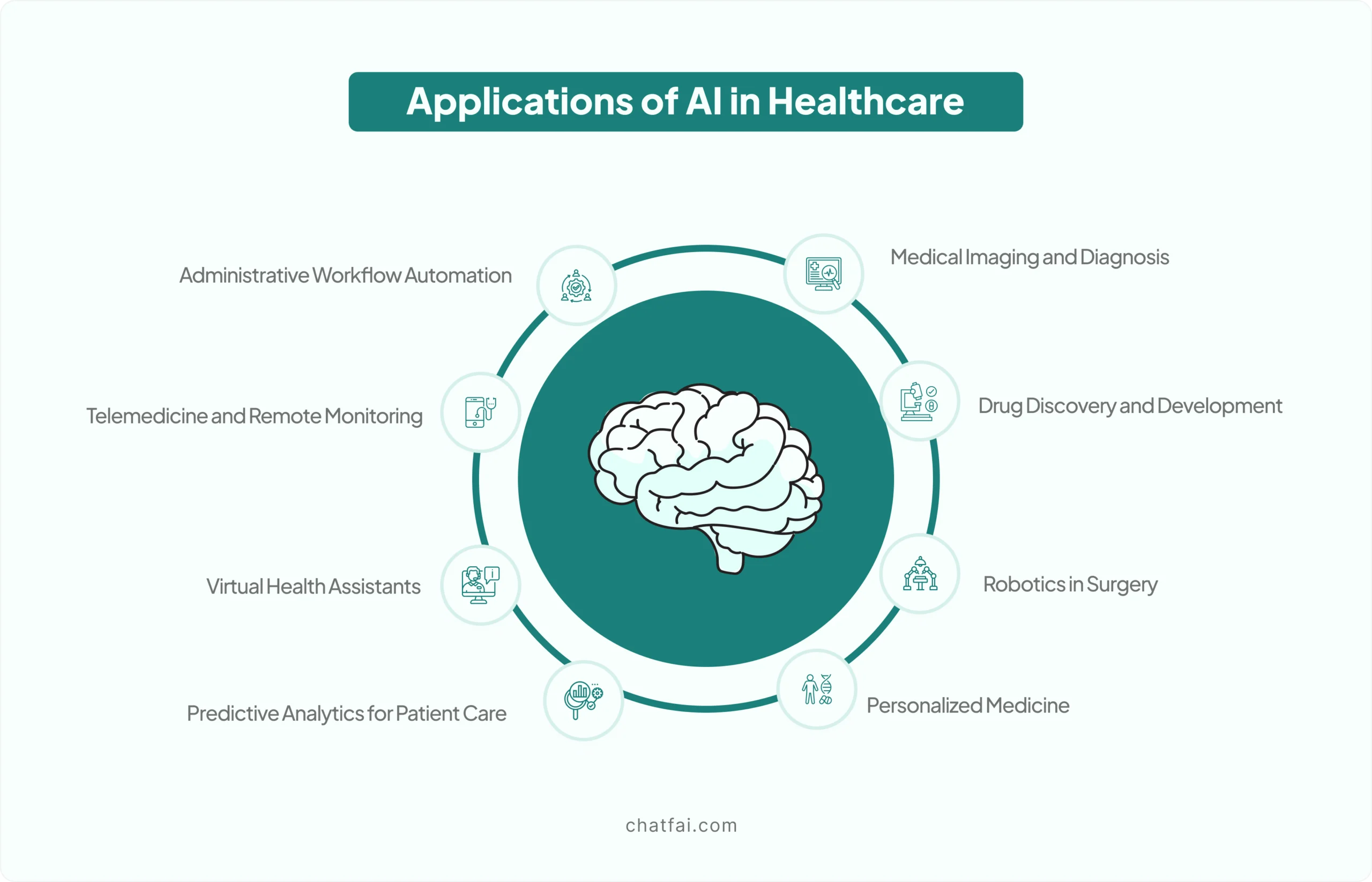Artificial Intelligence is remarkably transforming healthcare, making it more efficient and accessible. From diagnosing diseases faster than traditional methods to personalized treatment plans, AI is a game-changer.
The traditional healthcare system often struggles with slow diagnoses and medical errors. Additionally, generalized treatments don’t always provide the best outcomes for every patient.
Let’s explore how AI in healthcare is transforming the industry from benefits to use cases.
What is AI in Healthcare?

AI in healthcare uses machine learning algorithms and cognitive technologies to improve medical outcomes. It helps medical professionals in:
- Outcome prediction
- Assist with diagnosis
- Accurate diagnoses
- Personalized treatment plans
- Provide virtual health assistance
AI also plays a key role in analyzing large datasets, helping to develop preventive care strategies.
Benefits of AI in Healthcare
AI has a lot of benefits in the field of health. Here are some of them.

Helps Make Operation More Efficient
AI in healthcare is transforming the industry with numerous benefits. One major advantage is increased operational efficiency. It streamlines many administrative tasks, reducing the burden on staff.
This allows healthcare workers to spend more time with patients. Hospitals and clinics can optimize workflows, making processes faster and smoother.
Patient care improves significantly with less time wasted. This efficiency is crucial for meeting the demands of a growing population.
Potential to Improve User Experience
Another key benefit of AI in healthcare is its potential to improve user experience. Patients now have access to virtual assistants that can answer questions anytime. These tools make scheduling appointments easier and faster.
Patients receive timely reminders about their appointments and medications. Improved communication between patients and providers enhances satisfaction. A better user experience leads to more robust patient engagement and loyalty.
Improved Efficiency In Healthcare Diagnosis
AI plays a crucial role in improving efficiency in healthcare diagnosis. By quickly analyzing patient data, AI helps doctors diagnose conditions faster. Early detection is vital for successful treatment.
AI algorithms can interpret medical images, such as X-rays and MRIs, with high accuracy. These examples reduce human error and enhance diagnostic precision. As a result, doctors can make more informed decisions and provide better care.
Better Health Monitoring and Preventive Care
In addition to treatment, AI facilitates better health monitoring and preventive care. Wearable devices track vital signs, activity levels, and other health metrics.
These devices alert patient healthcare providers to potential health issues before they escalate. AI-driven apps can analyze this data and provide personalized recommendations. This proactive approach to healthcare helps patients manage their health more effectively.
Cost Reduction with Predictive Analytics
Another significant advantage of AI in healthcare is cost reduction. Predictive analytics allows healthcare providers to forecast patient outcomes and resource needs.
By predicting trends, hospitals can avoid unnecessary tests and procedures. This not only cuts costs but also improves patient care. Companies are investing in these technologies to enhance their services.
Healthcare providers can achieve significant savings and allocate resources more effectively by adopting AI solutions.
Challenges of AI in Healthcare
Along with benefits, many disadvantages cause concerns, which are:

Data Privacy Concern
One major challenge of AI in healthcare is data privacy. AI systems require access to large amounts of patient data to function properly, raising concerns about data security and privacy.
Lack of Transparency
Another challenge is the lack of transparency in decision-making. This can create mistrust among doctors and patients. Ensuring that AI systems are explainable and clear builds trust and encourages wider adoption.
High Cost of Implementation
While AI has clear benefits in healthcare, implementing it can be costly. These expenses can be prohibitive, especially for smaller hospitals or clinics.
Job Displacement Fears
AI has also sparked fears of job displacement. As AI systems take over tasks traditionally performed by humans, many healthcare workers worry about their job security.
Applications of AI in Healthcare
Here are the potential applications of AI in the medical and health fields:

- AI in healthcare assists in diagnosing diseases early by analyzing medical data, reducing human error.
- The algorithms can scan and interpret healthcare images like X-rays and MRIs faster and more accurately than humans.
- AI helps automate administrative tasks, freeing time for healthcare professionals to focus on patient care.
- Predictive analytics assist in managing hospital resources, reducing costs, and optimizing workflows.
- Many AI healthcare companies are developing robotic surgery tools that enhance precision and minimize risks during surgeries.
- AI supports drug discovery by analyzing vast data sets, speeding up the process of finding effective treatments.
Examples of AI in Health
AI in healthcare is not just a futuristic concept; it’s already transforming the medical field in many ways we might not even realize. For example,
AI is used in robotic process automation (RPA) to automate repetitive tasks like scheduling appointments, billing, and data entry. This frees up time for healthcare workers to focus on patient care.
AI chatbots quickly respond to patient inquiries, offering initial diagnoses based on symptoms.
Moreover, AI-driven platforms enhance mental health services by providing personalized support to users through real-time assessments and therapies.
Read out the essential medical chatbots in 2024.
Final Thoughts
AI in healthcare is revolutionizing the medical field, enhancing efficiency, accuracy, and personalized care. The benefits of AI are clear, from improving diagnosis and treatment plans to optimizing hospital operations.
Despite some disadvantages of AI in health and wellness, such as data privacy concerns and the potential for job displacement, the future is promising.
FAQs
How is AI used in healthcare?
AI is used to diagnose diseases and analyze images. It predicts outcomes, optimizes treatment plans, and automates administrative tasks, improving accuracy, efficiency, and personalized care.
What company is using AI in healthcare?
Companies like IBM Earson Health, Google Health, and NVIDIA lead the way in AI. It develops AI tools that assist with diagnostics, patient monitoring, and personalized treatment recommendations.
What is the best AI tool for doctors?
IBM Watson Health is considered one of the best AI tools for doctors. It offers powerful diagnostic support, treatment insights, and predictive analytics to improve patient outcomes and decision-making.
What are the pros and cons of AI in healthcare?
The benefits include improved efficiency, accurate diagnoses, and cost reduction. However, the disadvantages include data privacy concerns, high costs, and potential algorithm bias.